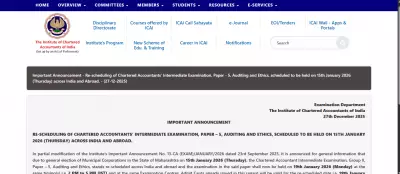
India's massive cohort of 1.3 million engineering college graduates is confronting a stark reality as campus hiring for IT roles faces a significant downturn for the third consecutive year. The class of 2026 is witnessing reduced job offers from major IT services companies and multinational technology centers, driven by accelerating automation, artificial intelligence adoption, and cautious market conditions.
Major IT Players Scale Back Campus Recruitment
According to placement heads from top Indian universities, IT services giants including Tata Consultancy Services, Infosys, and HCL Technologies are expected to hire substantially fewer graduates for the 2026 batch compared to previous years. This marks the third successive year of declining campus recruitment by IT services firms as they pivot toward specialized talent in artificial intelligence, cloud computing, and data analytics.
The hiring slowdown reflects a fundamental shift in the IT industry's growth model. Ramaiah Institute of Technology in Bengaluru has observed a dramatic reduction in recruitment numbers from major IT companies. "The country's largest IT services companies used to hire three-digit numbers two years ago, whereas now it has come down to two-digits, between 50-70 students," stated Sreenivasa Ramanujam Kanduri, dean of training and placements at the institute.
Multiple Factors Driving the Hiring Slowdown
The decline in campus hiring stems from several interconnected factors. Automation and AI are fundamentally changing how IT companies operate, enabling revenue growth without proportional increases in hiring. Companies are also engaging multiple IT vendors rather than relying on single providers, reducing the need for bulk hiring to service projects.
Dr. Badrinath V, dean of Corporate Relations at SASTRA Deemed University in Thanjavur, highlighted additional challenges: "Each of the IT services companies is looking at hiring smaller numbers this year compared with the last because of tariff wars in the US, AI impact and the post-covid overhang."
Uncertainty in the United States, the largest market for Indian IT outsourcers, has prompted companies to redirect technology spending toward essential business operations rather than new IT projects. This cautious approach has made IT services firms hesitant to commit to large-scale hiring.
Students Face Increased Competition and New Skill Demands
The changing hiring landscape means engineering graduates must demonstrate capabilities beyond traditional coding and application development skills. The reduced flow of job offers from IT services companies is creating intense competition among students, forcing them to develop specialized expertise to stand out in the job market.
Some institutions are taking proactive measures to protect student interests. National Institute of Technology in Jamshedpur has implemented a minimum compensation threshold for campus recruiters. "Since IT firms typically recruit in large numbers at lower entry-level packages of around ₹3.5-4 lakh per annum, we decided to cap recruiter participation at a minimum compensation of ₹6 lakh per annum for campus placements," explained Professor Saroj Kumar Sarangi, in-charge of Training and Placement.
The hiring numbers from major IT companies underscore the challenging environment. TCS plans to hire 42,000 freshers this fiscal year, while Infosys expects to recruit 20,000 and Wipro up to 12,000. HCLTech anticipates hiring more than 7,800 freshers, primarily for specialized skill-based roles.
Silver Linings in Specialized Roles and Non-IT Sectors
Despite the overall downturn in traditional IT hiring, opportunities are emerging in other areas. Global Capability Centers (GCCs) continue to recruit, though potentially at reduced volumes due to automation tools. These centers are focusing on skill-based roles, particularly in AI, rather than conventional software developer positions.
Balasubramanian Gurumurthy, chief placement officer of Birla Institute of Technology and Sciences, noted that companies like Okta, Epicor, and Expedia are offering competitive compensation packages, often matching or exceeding median salaries of ₹20 lakh.
Core engineering sectors including manufacturing, infrastructure, and emerging verticals like semiconductors are increasingly absorbing engineering talent. Consulting firms are maintaining strong hiring momentum, and early trends from summer placements indicate sustained demand from these recruiters.
ICICI Securities analysts Abhisek Banerjee and Jayram Shetty observed in a recent note: "While the outlook in junior IT hiring remains uncertain, demand for premium talent, GCC roles and non-IT roles remains robust."
The placement season for engineering colleges typically runs from September through March, giving remaining unplaced students until early 2026 to secure positions. However, placement executives acknowledge the real risk of the lowest placement offers in recent years, underscoring the transformed landscape for India's engineering graduates.





